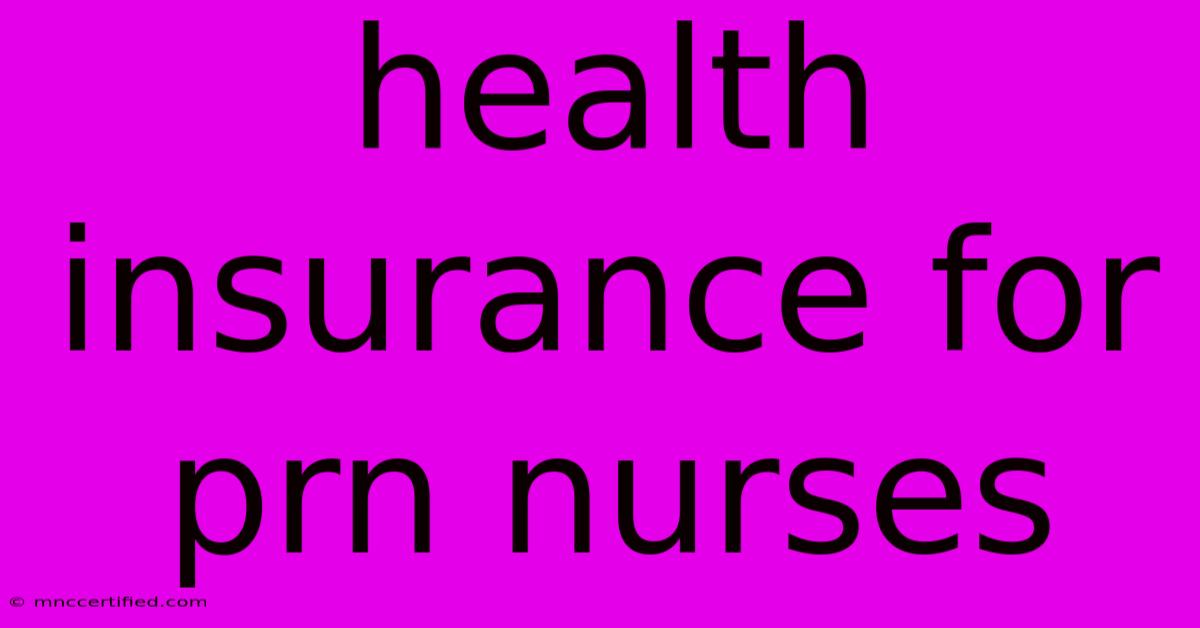Health Insurance For Prn Nurses

Table of Contents
Navigating the World of Health Insurance for PRN Nurses
Finding the right health insurance as a per-diem registered nurse (PRN RN) can feel like navigating a maze. Unlike full-time employees, PRN nurses often lack employer-sponsored health insurance benefits. This guide will illuminate the options available, helping you secure affordable and comprehensive coverage.
Understanding the Challenges Faced by PRN Nurses
The unpredictable nature of PRN work presents unique challenges when it comes to health insurance. Inconsistent income makes it difficult to budget for premiums, and the lack of employer contributions means you're solely responsible for the cost. This often leads to tough choices between securing adequate coverage and managing personal finances.
Key Differences from Full-Time Employment
- No employer-sponsored plans: This is the biggest difference. Full-time nurses typically receive subsidized health insurance through their employers. PRN nurses don't have this benefit.
- Variable income: Your income fluctuates depending on the number of shifts you work, making it hard to predict monthly healthcare expenses.
- Limited access to group rates: Group rates, usually offered through employers, generally provide lower premiums than individual plans.
Exploring Your Health Insurance Options
Fortunately, several avenues exist for PRN nurses to obtain health insurance:
1. The Affordable Care Act (ACA) Marketplace
The ACA Marketplace, also known as Healthcare.gov, is a government-run website where you can compare and purchase individual health insurance plans. This is often the most viable option for PRN nurses.
- Subsidies: You may qualify for government subsidies to lower your monthly premiums based on your income.
- Plan Variety: The marketplace offers various plans, from Bronze (low premiums, high out-of-pocket costs) to Platinum (high premiums, low out-of-pocket costs). Choose a plan that balances your budget and healthcare needs.
- Open Enrollment: Be aware of the annual open enrollment period to avoid penalties.
2. COBRA
If you recently left a job with employer-sponsored health insurance, COBRA allows you to continue your coverage for a limited time. However, you'll pay the full premium, which can be significantly higher than employer-subsidized plans. Consider this option carefully, as it might not be financially feasible in the long run.
3. Spouse's or Partner's Plan
If your spouse or partner has employer-sponsored health insurance, adding yourself to their plan might be the most cost-effective solution. Check their plan's eligibility requirements and associated costs.
4. Private Insurance Companies
You can also purchase individual health insurance plans directly from private insurance companies. Compare quotes from multiple insurers to find the best coverage at the most competitive price.
Tips for Choosing the Right PRN Nurse Health Insurance Plan
- Assess your healthcare needs: Consider your current health status and potential healthcare costs when selecting a plan.
- Understand your deductible, copay, and out-of-pocket maximum: These factors significantly impact your healthcare expenses.
- Compare plans carefully: Don't solely focus on premiums; compare the overall costs, including deductibles, copays, and out-of-pocket maximums.
- Check provider networks: Ensure your preferred doctors and hospitals are in the plan's network. This can significantly reduce your healthcare costs.
- Consider a health savings account (HSA): If you choose a high-deductible health plan (HDHP), an HSA can help you save money for healthcare expenses tax-free.
Managing Healthcare Costs as a PRN Nurse
Beyond choosing the right plan, actively managing your healthcare costs is crucial:
- Preventive care: Regular checkups and screenings can help prevent costly health problems down the line.
- Generic medications: Opt for generic medications when possible to save money.
- Negotiate medical bills: Don't hesitate to negotiate lower medical bills with providers.
- Shop around for healthcare services: Compare prices for different services to find the most affordable options.
Becoming a PRN nurse offers flexibility, but securing appropriate health insurance requires careful planning and research. By understanding your options and following these tips, you can find a healthcare solution that fits your budget and lifestyle. Remember to stay informed about changes in healthcare laws and regulations to ensure you're always making the best choices for your health and financial well-being.

Thank you for visiting our website wich cover about Health Insurance For Prn Nurses. We hope the information provided has been useful to you. Feel free to contact us if you have any questions or need further assistance. See you next time and dont miss to bookmark.
Featured Posts
-
Will Insurance Cover Dui Damage
Nov 24, 2024
-
How To Watch Northwestern Vs Michigan Ncaa
Nov 24, 2024
-
Fatal Storm Bert Uk Faces Severe Flooding
Nov 24, 2024
-
Arsenals 2000th Top Flight Win
Nov 24, 2024
-
Benfica Vs Estrela Prediction And Lineup
Nov 24, 2024